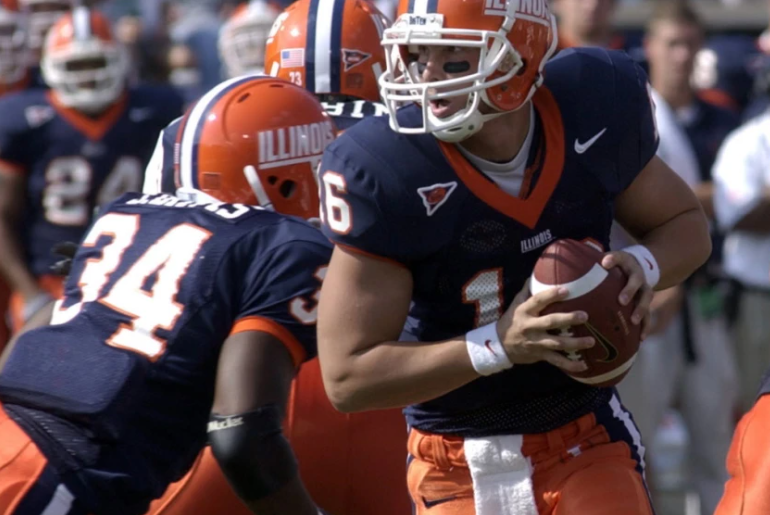
Former QB Turned Cop Accused of Baseball Card Heist
In a stunning twist of fate reminiscent of a plot pulled from the pages of a pulp crime novel, the once celebrated Illinois quarterback-turned-Chicago cop, Christopher Pazan, finds himself embroiled in allegations that would make the most hardened Chicago private eye raise an eyebrow. This time, the supposed crime considers pilfering a treasure trove of baseball cards—worth approximately $300—from a suburban Meijer store.
The curious incident unfolded in Evergreen Park, a bucolic suburb nestled alongside Chicago’s whirlwind of urban charm. Sgt. Victor Watts, delivering details with the bemusement of a detective unraveling the perplexing twists of a whodunit, recounted how Pazan allegedly slipped the coveted cards into a humble yard waste bag, crafting a ruse as artful as any sleight of hand. While he had dutifully paid for the bag, he apparently left the establishment card-rich but cash-poor, a fatal mistake captured with clarity on the omnipresent eyes of the store’s surveillance cameras.
This unfortunate chapter in Pazan’s life unfolds in the shadow of what once seemed like a storybook career. As a young quarterback at Brother Rice High School in Mount Greenwood, Pazan dazzled under the night lights, earning All-American honors for his gridiron exploits. His prowess on the field led him to the University of Illinois, where he tested opponents’ defenses and his mettle, albeit as a starter for only a sliver of his college tenure. Coaching stints at Illinois and St. Joseph’s College poised him near the precipice of sports luminary; instead, his path took a decidedly different turn.
In 2015, Pazan traded his shoulder pads for the badge of the Chicago Police Department, weaving himself into the complex tapestry of The Windy City’s law enforcement. A dream that was passionately articulated in a poignant interview with the Chicago Tribune, where he expressed an ambition “to serve in a different capacity,” as if the service on and off the field were not polar positions but kin spirits.
Yet, now, courtesy of a slender envelope of baseball cards, Pazan sees himself on the ornate carousel of legal proceedings. His police powers have been suspended as an internal investigation paints his new reality in hues far different than those on his honorary college jersey. Financial hurdles toy with the narrative like ghosts haunting each corner of the tale. The ex-quarterback earns a respectable $111,804 annually sans overtimes from the Chicago taxpayer, and yet, finds himself tethered to financial woes as confounding as his legal predicament.
Divorce proceedings serve as a backdrop, threads of financial obligations and alleged lapses weaving a tapestry marked by lawsuits and banking maneuvers. The sum of $5,800 dangles over him like a sordid sword of Damocles, his erstwhile attorney seeking reprisal in the courts for fees unpaid. Meanwhile, efforts to reach his legal representation ring hollow, much like attempts to garner a direct comment from the quarterback-turned-lawman.
In an audacious attempt to stave off financial ruin, Pazan navigates the convoluted channels of real estate refinancing, his Beverly home pivoting from personal fortress to a calculative asset amid storms of fiscal adversity. In an echo from financial records past, debts emerge from the shadows like familiar phantoms. Fifth Third Bank pursued an elusive loan repayment of over $4,000 last year, only for the chase to fizzle when Pazan faded like vapor. JPMorgan Chase scripted a similar narrative over a staggering $15,000 in 2022—though here resurfaced a touch of resolution, the debt ostensibly vanquished by mid-2024.
The sharp edge of irony slices deeply; Chicago’s police academy scrutinizes recruits with financial woes with the gavel of judgment—a lesson potentially lost on Pazan. Yet, the guidelines exist to shield against vulnerabilities financial dilemmas might inflame in the moral fabric of officers.
Now facing a misdemeanor count of retail theft, Pazan steels himself for an upcoming court date set for June 23 at the Bridgeview courthouse. Legal challenges loom large, wrapping around the narrative of Chris Pazan like coils from a gripping crime drama. His journey from star quarterback to serving the public defiantly warps—the allure of a stack of baseball cards etching an unexpected chapter in a life once dotted with touchdowns and accolades. It stands as a reminder of how fortunes can flip, leaving behind the clippings of dreams unfulfilled and the stark certainty of reality lived.